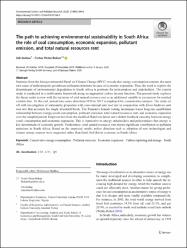The path to achieving environmental sustainability in South Africa: the role of coal consumption, economic expansion, pollutant emission, and total natural resources rent
Özet
Statistics from the Intergovernmental Panel on Climate Change (IPCC) reveals that energy consumption remains the main
root cause of anthropogenic greenhouse pollutant emissions because of economic expansion. Thus, the need to explore the
determinants of environmental degradation in South Africa is pertinent for policymakers and stakeholders. The current
study is conducted in a multivariate framework using an augmented carbon income function. The present study explores
the theme under review with the inclusion of total natural resource rent as an additional variable to circumvent for omitted
variable bias. To this end, annual time series data from 1970 to 2017 is employed for econometrics analysis. The study set
off with investigation of stationarity properties with conventional unit root test in conjunction with Zivot-Andrews unit
root test that accounts for single structural break. The Pesaran’s bounds testing techniques traces long-run equilibrium
relationship between energy (coal) consumption, pollutant emission, total natural resources rent, and economic expansion
over the sampled period. Empirical test from the modified Wald test detect and validate feedback causality between energy
(coal) consumption and economic expansion. This is instructive to energy stakeholders and policymakers that energy is
key determinant of economic growth. Furthermore, total natural resources rent shows significant contribution to pollutant
emissions in South Africa. Based on the empirical results, policy direction such as adoption of new technologies and
cleaner energy sources were suggested rather than fossil fuel driven economy in South Africa.
Cilt
27Sayı
9Bağlantı
https://hdl.handle.net/11363/5385Koleksiyonlar
Aşağıdaki lisans dosyası bu öğe ile ilişkilidir:


















